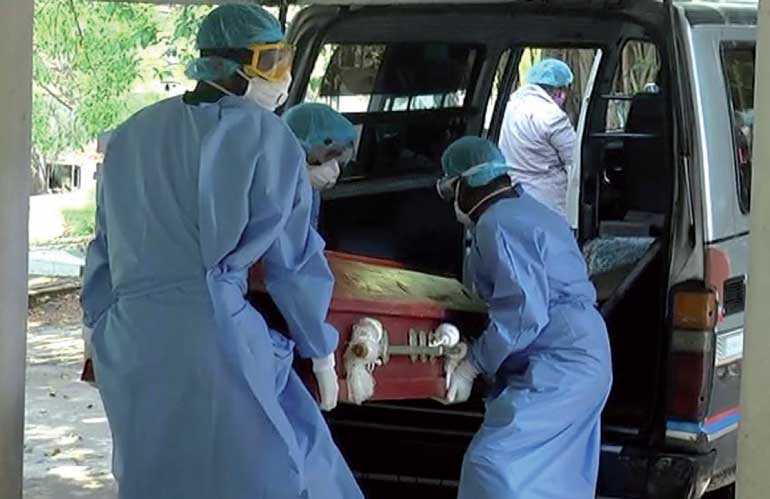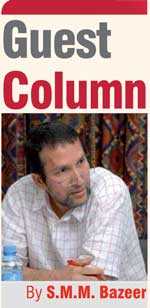Wednesday Feb 25, 2026
Wednesday Feb 25, 2026
Saturday, 18 April 2020 00:01 - - {{hitsCtrl.values.hits}}

 “The dead are less than human beings, but still reminiscent of them, and they are more than bodies or objects. This invites us to speak about the dead in a language of posthumous dignity and respect, and about the living, therefore, as having some definable core responsibilities to the dead” – Antoon de Baets
“The dead are less than human beings, but still reminiscent of them, and they are more than bodies or objects. This invites us to speak about the dead in a language of posthumous dignity and respect, and about the living, therefore, as having some definable core responsibilities to the dead” – Antoon de Baets
Though Sri Lanka encountered its first Chinese COVID-19 patient and discharged her after a few weeks of successful treatment, it appeared that Sri Lanka had not yet augured what was in the offing and had had no nationwide guidelines with regard to disposal of the bodies of COVID-19 deaths.
Once Batticaloa Campus was temporarily commandeered by the military for the quarantine purposes by the Director General of Health Services (DGHS), the Judicial Medical Officer attached to the District General Hospital, Polonnaruwa, issued an ad hoc Standard Operating Procedure (SOP) concerning the handling and disposing of dead bodies from COVID-19, in which it is spelt out “only cremation is allowed”. Nothing was mentioned about burial.
Unfortunately for Sri Lankan Muslims, ugly nationalism has a history of boiling up and violently erupting. After the Easter attacks of last year, many were persecuted, and harassed, for neither rhyme nor reason. The COVID-19 pandemic brings such familiar worries with it
This SOP followed by Provisional Clinical Practice Guidelines (PCPG) on COVID-19 issued by the Ministry of Health on 27 March, in collaboration with Ceylon College of Physicians and Epidemiologists, setting out in clear terms without any ambiguity that COVID-19 victims can also be buried but “the grave should be a depth of six feet and it should not contaminate with ground-water; and the grave should be identifiable and traceable”.
Given the extreme risk of the virus, representatives of the Muslim community waived certain rituals prior to burial but insisted on the burial in line with their religious belief and practice. This is not an exclusive nor exceptional request put forward by the Muslims of Sri Lanka but an international norm accepted by all other countries where Muslims live as minorities. These national guidelines soothed the Muslims community so that they praised the governments for taking on board their concerns about their religious rights/rites. Nonetheless, a couple of days later, on 29 March, Dr. Anil Jasinghe, the Director General of Health Services who is the Spokesperson for the Ministry of Health, appeared on a local TV channel. He confirmed the burial option of those who succumbed to COVID-19, according to the international quarantine regulations, and PCPG.
It is common knowledge that burial is allowed under international quarantine law and WHO guidelines. However he went further to recommend cremation whilst allowing burial of eight feet underground. This was slightly different from the existing guidelines with regard to the depth of a six-foot grave. This proved that he was the ultimate authority on the issue of burial or cremation.
It later became much clearer when GMOA wrote to him to “decide the best cause of action with regard to the disposal of bodies of those who die of COVID-19, in consultation with the experts”.
This again was reinforced by a statement of a GMOA Spokesperson, Dr. Ravindra Zoysa, that the DGHS is the deciding authority to issue the final ruling on this matter. Day by day it becomes much clearer that DGHS is the sole authority to make decisions whilst the Government is passing the buck to the experts.
It is preposterous to seek expert advice on the issue of burial which was existing in the previous PCPG, and prepared by 14 experts of various medical and clinical disciplines amended overnight without any explicable reasons. None of the experts who were in the making of the guidelines were from minority communities except an editorial assistant, Dr. Azhar Ghouse, who would have had no say at all in terms of the issues set out in the guidelines.
It is in this background Mohamed Jamal, the first COVID-19 victim, passed away at Negombo General Hospital on 30 March, before PCPG on COVID-19 were revised to expunge burials. In the early hours of 31 March at around 12:30 a.m., Mohamed Jamal was cremated, and in that the very same morning, the PCPG was amended to reflect only cremation to every victim of COVID-19. The timely amending of the PCPG to coincide with the date of the burial raises suitable concerns; was it just a coincidence or concomitant?
On that fateful night, when the dead were transported for cremation, the writer contacted some SLPP Muslims in Colombo, who could encourage the hierarchy of the Government to intervene in stopping cremation. All their efforts – including the last minute interference of Ali Sabri PC with top Government officials – failed and the local health authority had its final decision executed with, of course, some approval from the above. It is unfortunate that the Muslims had to mainly rely on a single individual, Ali Sabri, PC to politically intercede with the higher-ups and encourage consideration of Sri Lankan Muslims, to stop cremation at the eleventh hour. SLMC Leader Rauf Hakeem and some other Muslims dignitaries had to come up with a different reason, such as difficulties in digging a 10-foot grave or transporting the body to Colombo due to jurisdiction issues. It is distressing and painful for all Sri Lankan Muslims, both within Sri Lanka and the diaspora, who had enjoyed their religious practices and observances within a multi-religious environment.
One of the sons of the deceased confirmed that the MOH of Negombo Hospital had notified him of his father’s death and agreed to have him buried but then later claimed that he could not contact him as his phone was switched off. That is subject to strict proof and scrutiny, considering that the MOH later claimed that he was advised by the Director to cremate the body. It became clearer as to who ordered the cremation despite guidelines allowing burial.
This indicates that those who were involved in the decision of cremation sought to set the precedent for future cremation. This was a flagrant violation of guidelines in force and if the DGHS ordered the carrying out of the cremation, he should be held accountable for such a breach. The DGHS is of the opinion that the experts in various parts of the world such as USA, UK and Singapore are substandard to Sri Lankan experts in making a dissimilar finding that the COVID-19 victims should only be cremated rather than buried.
By way of example, the UK’s Coronavirus Bill was successfully amended overwhelmingly by Parliamentarians from many backgrounds to ensure the appropriate burial for those of Muslim and Jewish faith by preventing cremation. The amendment was included in the bill and passed legislation, demonstrating compassion and commitment to the Muslims and Jewish minorities.
The minority Muslims who constitute 4.8% of the total population of 64.6 million, had been able to table an amendment Under Part 3 of this schedule (27), such that Bill states: “Local authorities and the appropriate national authorities must have regard to the desirability of disposing of a dead person’s body or other remains, in accordance with the person’s wishes, if known, or otherwise in a way that appears consistent with the person’s religion or beliefs, if known.”
As in the public domain now, the first COVID-19 victim was cremated against the wish of the family and in violation of the option provided in the PCPG by the authorities. Those who wanted to go ahead with the burial seemed eager to set a misguided and authoritarian precedent, one that deeply violates the faith and practice of Sri Lankan Muslims. Following the cremation, several anecdotes have emerged from various quarters of vested interest relating to the burial, some of which clearly demonstrate the culpability of the authorities.
Given the extreme risk of the virus, representatives of the Muslim community waived certain rituals prior to burial but insisted on the burial in line with their religious belief and practice. This is not an exclusive nor exceptional request put forward by the Muslims of Sri Lanka but an international norm accepted by all other countries where Muslims live as minorities
Circulating on social media have been reports that the Director of Negombo Colombo Hospitals Dr. R.M.S.S. Ratnayaka claimed that the first Muslim COVID-19 victim Mohamed Jamal could have been buried had they (Negombo Hospital) received the airtight sealed body bag from abroad. This storyline did not corroborate with the account of Risvy Mufti, the President of Jammmiyathul Ulama (apex religious body of the Muslims theologians) who appeared on local TV, with an explanation that the bags had in fact been received from abroad for the purpose of burial of the Muslims dying from COVID-19 in Negombo. What had not arrived however, were the PCPG, which had not been circulated to all the hospitals, thus resulting in the cremation of Mohamed Jamal.
Unfortunately for Sri Lankan Muslims, ugly nationalism has a history of boiling up and violently erupting. After the Easter attacks of last year, many were persecuted, and harassed, for neither rhyme nor reason. The COVID-19 pandemic brings such familiar worries with it, particularly after the now infamous Derana clip involving Minister Mahindananda Aluthgamage and others, where Muslims were implied to be responsible for community transmission.
While former Speaker Karu Jayasuriya has compared the COVID-19 pandemic with the pathogen of racism, the haste in cremation of Muslim victims and the swiftly-enforced curfew hours seems to have happened without much ado, and a bygone incident.
There are devastating consequences of Muslim cremation and the Government-imposed censorship on the details of the ethnicity of deaths to proceed with crematory procedures of the COVID-19 Muslim victims. Not only is this a violation of the freedom to manifest one’s religion or belief in worship, teaching, practice, and observance as enshrined in the constitution, but also demonstrates Government neglect of their responsibilities in upholding and protecting the right to freedom of thought, conscience, and religion.
It is heartening to note that civil society among all the communities have now voiced their support for the burial of the Muslim COVID-19 victims. It is also welcomed that the Human Rights Commissioner of Sri Lanka Dr. Deepika Udagama has resounded the cry of civil society for burial and urged the Government to listen to communities concerned about burial.
Whilst appreciating the relentless services of the health sector and the military of Sri Lanka under the leadership of President Gotabaya Rajapaksa, it is appropriate to now recall his request for “all as true Sri Lankans to join me in my journey forward,” for which the people of Sri Lanka irrespective of ethnicity and religion, have rallied round him to take the country forward at this time of COVID-19 crisis. Notwithstanding, it must also be recalled that he further pledged, “But, as your new president, all communities in the country will have the freedom to practice their religious beliefs. We will always protect this right.”
With this in mind, the writer is inclined to ask whether the President would uphold his pledge and ensure that the religious rights of Sri Lankan Muslims, both in general and their funeral rites in particular, are upheld at this especially crucial time; or whether the sweeping nature of these practices simply forebodes the sinister “one law” agenda.